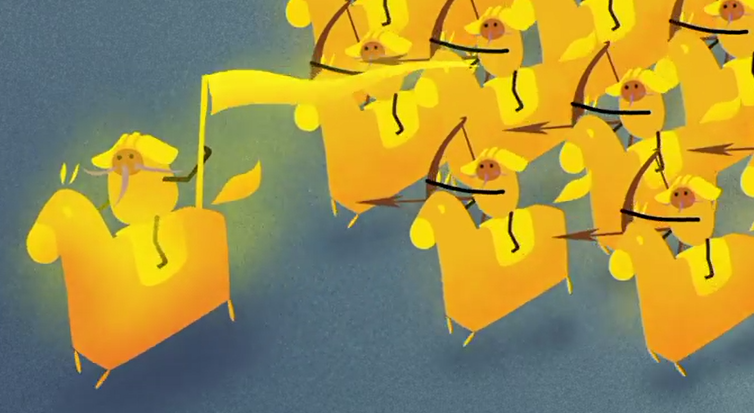With Vladimir's conversion and marriage to the Byzantine emperor's sister, as well as continued trade along the Volga route, the relationship between the two civilizations deepened.
通过弗拉米尔的转变,还有他和拜占庭皇妹的联姻以及伏尔加河上蓬勃发展的贸易,两个帝国的关系更加紧密了。
Byzantine missionaries created an alphabet for Slavic languages based on a modified Greek script while Rus Viking warriors served as the Byzantine Emperor's elite guard.
罗斯帝国的维京战士在拜占庭帝国做一流守卫的同时,拜占庭的传教士根据改良版的希腊字母为斯拉夫语创造了一套新的字母表。

For several generations, the Kievan Rus flourished from its rich resources and trade.
在很长一段时间后,基辅罗斯由于自身丰富的资源和蓬勃发展的贸易变得十分强大。
Its noblemen and noblewomen married prominent European rulers, while residents of some cities enjoyed great culture, literacy, and even democratic freedoms uncommon for the time.
他们的贵族在与欧洲其他统治者联姻的同时,当地居民还享受着他们自己伟大的文化、文学甚至是当时罕有的民主自由。
But nothing lasts forever.
但是好景不长。
Fratricidal disputes over succession began to erode central power as increasingly independent cities ruled by rival princes vied for control.
兄弟间争夺继承权的斗争使中央集权逐渐瓦解,王子争夺着不同城市的统治权。
The Fourth Crusade and decline of Constantinople devastated the trade integral to Rus wealth and power, while Teutonic crusaders threatened northern territories.
当日耳曼的十字军逐渐抵达北部时,随着第四次十字军战争和君士坦丁堡的沦陷,基辅罗斯因贸易而积攒的财富和权力慢慢沦陷。
The final blow, however, would come from the east.
然而,压死骆驼的最后一根稻草来自东部。
Consumed by their squabbles, Rus princes paid little attention to the rumors of a mysterious unstoppable hoard until 1237, when 35,000 mounted archers led by Batu Khan swept through the Rus cities, sacking Kiev before continuing on to Hungary and Poland.
王子们执着于眼前的争吵,忽视了当地对一个神秘快速发展的组织的流言,直到公元1237年,成吉思汗率领着3万5千名骑兵横扫了基辅罗斯的所有城市,洗劫了首都基辅后又前往匈牙利以及波兰。
The age of Kievan Rus had come to an end, its people now divided.
基辅罗斯的时代告一段落,原基辅罗斯的居民如今也散布在世界各地。
In the east, which remained under Mongol rule, a remote trading post, known as Moscow, would grow to challenge the power of the Khans, conquering parts of their fragmenting empire, and, in many ways, succeeding it.
在仍被蒙古人统治着的东方,有一个叫做莫斯科的贸易点成长起来,能挑战可汗的权力,他们夺回了破碎帝国的部分领土之后势如破竹。
As it absorbed other eastern Rus territories, it reclaimed the old name in its Greek form, Ruscia.
他们逐渐吸收了原属基辅罗斯的东部领土,改变了原来的名字,用了希腊发音,叫Ruscia。
Meanwhile, the western regions whose leaders had avoided destruction through political maneuvering until the hoard withdrew came under the influence of Poland and Lithuania.
与此同时,西部地区的统治者们一直通过一些政治手段规避风险直到蒙古骑兵撤退,但他们仍然遭受着波兰和立陶宛的影响。
For the next few centuries, the former lands of Kievan Rus populated by Slavs, ruled by Vikings, taught by Greeks, and split by Mongols would develop differences in society, culture and language that remain to the present day.
在接下来的几个世纪,基辅罗斯的这片领土上曾填满了斯拉夫人,他们曾被维京人统治、被希腊人教导、被蒙古人瓜分,最终形成了社会、语言、文化的多元,一直延续到今天。



